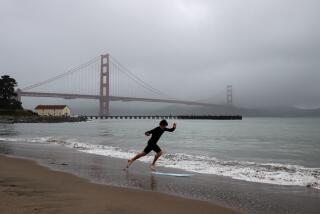Debate Is Prologue to Key Court Actions on Mono Lake
SOUTH LAKE TAHOE, Calif. — Setting up a crucial turn in the 11-year legal battle over Mono Lake water, National Audubon Society and Los Angeles attorneys Wednesday argued very different scenarios of the threat the city’s growing thirst poses to the picturesque but shrinking Eastern Sierra salt lake.
The Audubon Society asked that Los Angeles be stopped from taking any more Mono Lake stream water this year, arguing that the lake is close to again falling below a critical level needed to protect California gull nests from coyotes and other predators. The conservation group’s stance was backed by the Mono Lake Committee, an activist group that favors protecting the lake, and the U.S. Forest Service, which administers a scenic area established by Congress around the lake.
But, in an all-day confrontation in a South Lake Tahoe courtroom, attorneys for the Los Angeles Department of Water and Power said the threat is overstated and argued that the 16% of the Los Angeles water supply that is shipped south from Mono Basin must continue to flow.
El Dorado County Superior Court Judge Terrence M. Finney did not immediately rule on the preliminary injunction sought Wednesday by the Audubon Society, which first sued Los Angeles in May, 1979, over environmental damage from the city’s diversion of streams that historically filled Mono Lake.
Los Angeles lost a crucial round in that case when the California Supreme Court ruled last year that the lawsuit was valid. Finney has been selected to preside over a trial next year in that suit and two others that seeking to protect fish in streams that flow down from the High Sierra and into Mono Lake, which is too saline to support fish but is a major nesting area for California gulls and a stopover for migrating birds, all of which feed on brine shrimp and brine flies.
Finney’s decision on the preliminary injunction--expected within 30 days--will set ground rules to be used until that trial is held. It will, in effect, decide for now if the lake can fall below a level that will uncover a land connection to islands where the gulls nest.
In the late 1970s and early ‘80s, when the lake level plunged, the land bridge was exposed and coyotes were able to reach Negit Island. The nesting gull colony was nearly destroyed, Audubon attorney F. Bruce Dodge said.
If the city is allowed to divert its usual amount south this year--the third straight year of lower-than-normal snowfall in the Eastern Sierra--the connection to Negit Island will be exposed again. The lower lake level will also expose more of the lake bed to windstorms and lead to a worsening of the dust cloud problem that has plagued the Mono Basin and Owens Valley areas in recent years, he said.
Dodge said the lake is currently less than two feet above the water level needed to keep coyotes off Negit Island. If the preliminary injunction is denied and Los Angeles continues to export Mono Basin water this summer, he said, “it is undeniable that Negit Island will be connected to the mainland.”
Dodge and attorney Patrick Flinn also argued that Los Angeles water use has grown in recent years by much more than the amount needed this year to protect Mono Lake, and said that the city can easily replace the water if it chooses through its unused entitlement to large amounts of water delivered to Southern California from the Sacramento-San Joaquin Delta by the Metropolitan Water District.
However, attorney Adolph Moskovitz, representing the DWP, said that the lower water level does not pose the “irreparable harm” required before the city can be denied its right to export water.
He unveiled a proposal by the city to lower the lake level four to six feet in order to study the effect on the lake’s ecosystem. Moskovitz said the lake dropped that far in recent years without irreversible damage, but that scientists did not take advantage of the drop to study how able the lake’s ecosystem is to endure stresses.
Los Angeles’ right to take water from Mono Lake streams is also under threat in another lawsuit.
More to Read
Sign up for Essential California
The most important California stories and recommendations in your inbox every morning.
You may occasionally receive promotional content from the Los Angeles Times.










